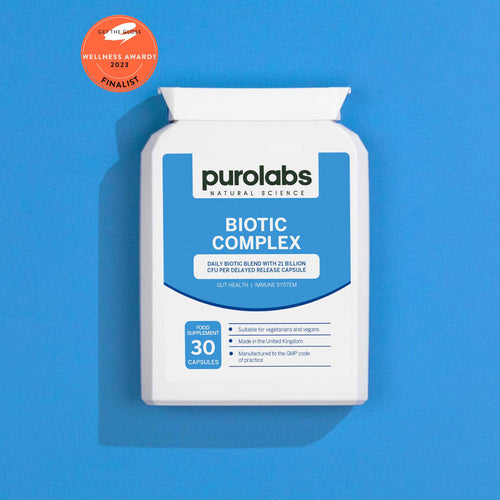Gut health is the most widely discussed topic when it comes to human health and nutrition. We are fascinated by how our guts work and are increasingly understanding that gut health is integral to overall health.
We now recognise that gut health is linked to obesity, autoimmune conditions, metabolic health and even mental health and wellbeing. Supporting our gut is the single most important thing we can all do to boost our chances of living a long and healthy life.
Gut health is a complex and still relatively undiscovered topic. We have only clinically scratched the surface when it comes to exploring our digestive system, with new discoveries made daily. We know that what we eat can have the single biggest impact on our gut health; however, knowing exactly what and when to eat can be complicated, and at times – just downright confusing.
So, with that said, one of the simplest things you can do to support a healthy gut is to supplement with a good quality probiotic.
1. What are CFUs and why are they important?
Colony forming units (CFUs) is a measurement for the amount of live bacteria in a probiotic supplement. CFUs are generally counted in billions, with probiotic supplements ranging significantly.
It is important to note that more necessarily doesn’t mean better when it comes to CFU count. Probiotic supplements on the market can contain up to 50-60 billion CFUs per dose, but lack other components that truly make an effective probiotic1:
Delivery mechanism – is the bacteria reaching the intestines alive?
Bacterial variety – does the probiotic contain at least several different strains of bacteria?
Bacterial type – does the probiotic include popular beneficial strains of bacteria like lactobacillus and bifidobacterium which are found in large amounts in the intestines? Does it also include antibiotic resistant strains of bacteria like lactobacillus rhamnosus?
2. Are all probiotics the same?
All probiotics are certainly not the same. Probiotic supplements are, by far, the most potent probiotic containing product across all probiotic containing foods and beverages. Probiotic supplements, due to their controlled formulations also tend to contain antibiotic-resistant determinants which are incredibly beneficial for protecting our vulnerable gut against potential pathogens2.
Due to the rapidly growing popularity of probiotics, there is a vast range of probiotic foods and supplements on the market. Whilst they are not as potent as their supplemental counterparts, they have been shown to help support our gut microbiome and can be enjoyed as part of a healthy varied wholefoods diet3.
The most common probiotic containing foods are:
- Sauerkraut
- Sourdough
- Kimchi
- Live yoghurt
- Miso
- Tempeh
- Kefir
The CFUs stated on a food-based probiotic can be confusing and misleading. As food-based probiotics aren’t as controlled as supplements, the amount of good bacteria in the food item may not be the amount of bacteria that reaches the gut alive. The acidic environment of the stomach can kill many forms of beneficial bacteria, with probiotic supplement formulations accounting for this. For this reason, probiotic supplementation is generally the best ‘type’ of probiotic you can take daily.
Two bacterial strains which have been shown to be antibiotic resistant and can withstand the acidic environment of the stomach, are lactobacillus acidophilus and Lactobacillus rhamnosus. Our biotic complex at Purolabs contains both of these strains of beneficial bacteria making it an ideal supplement to take for those who are taking antibiotics or have chronic gut symptoms like bloating, constipation, diarrhoea and/or discomfort4.

Biotic Complex
3. Is one strain better than multi-strain?
As with many questions pertaining to nutrition, the answer isn’t clear cut for everyone. However, a general rule of thumb is that multi-strain formulations are more beneficial for the microbiome that single strain supplements.
A diverse microbiome is a thriving microbiome, with varied strains of bacteria linked to a lower risk of gut infections and an improvement in common gut symptoms like bloating, constipation and diarrhoea. An Oxford study found that certain beneficial strains of bacteria have commensal properties meaning that when they are taken together, it boosts the combined benefits and anti-pathogenic properties5.
4. Are probiotics only for gut issues?
As gut health is central to overall health, probiotics indirectly improve many facets of overall health, including:
- Improved mental health, stress, energy and sleep
- May reduce cholesterol and blood pressure6
- Boost immunity, including helping to fight off infections
- Helping to reduce the risk of obesity7
- Improve overall metabolic health
Another direct and significant benefit of taking probiotics is that it also impacts our skin and vaginal microbiome, which are linked and influenced by our gut microbiome. Studies show that taking probiotics can help with yeast and UTI infections as well as improving inflammatory skin conditions like acne, eczema and psoriasis8.
5. Are prebiotics important?
Prebiotics are non-digestible fibres that are used as food for good bacteria residing in the gut. They are just as important as probiotics when it comes to gut health as they help to grow beneficial bacteria populations, improve microbiome diversity and balance.
Whilst prebiotic supplements are a great way to feed your gut bugs, including a daily source of dietary prebiotics can be just as beneficial. Prebiotic foods include:
- Kiwis
- Garlic
- Onions
- Leeks
- Artichoke
- Chicory root
- Dandelion greens
6. Who should consider taking a probiotic?
Probiotics should be used as a daily addition to a varied diet and balanced lifestyle. They are generally safe and well tolerated, making them useful for people during all life stages, from aged 12 months through to later years.
As we age, we naturally produce less stomach acid which affects our ability to absorb nutrients, which in turn impacts microbiome health. Taking a good quality probiotic can be incredibly beneficial for elderly populations who need a digestive boost.
The majority of our immune system lives in the gut, making probiotics a promising choice as a daily boost to immune function. There is evidence to show that probiotics may help support the progression and presentation of autoimmune conditions:
Skin: Psoriasis, eczema, dermatitis
Endocrine: Hashimoto's disease, Graves disease, Addison’s disease
Structural: Arthritis, Sjogren’s syndrome
Gut: Crohn’s disease, ulcerative colitis, celiac disease
Studies show that mothers influence foetal and infant immunity through their gut microbiome and breastmilk, making probiotic supplementation during pregnancy and breastfeeding a key consideration9.
Whilst probiotics can be an integral part of a gut boosting toolkit for those with a range of health symptoms, probiotics can also provide a daily boost to the average person who is simply looking to protect and support their gut.

 Beauty
Beauty
 Bone Health
Bone Health
 Brain Health
Brain Health
 Energy
Energy
 Eye Health
Eye Health
 Gut Health
Gut Health
 Hair
Hair
 Hormonal Health
Hormonal Health
 Heart Health
Heart Health
 Immunity
Immunity
 Joints
Joints
 Menopause
Menopause
 Pregnancy
Pregnancy
 Kids
Kids
 Sleep
Sleep
 Stress & Mood
Stress & Mood




















